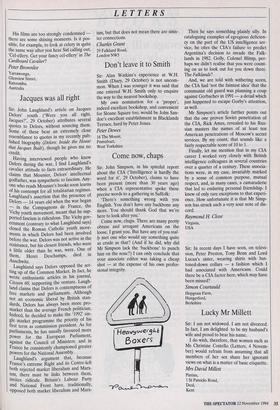Come now, chaps
Sir: John Simpson, in his spiteful report about the CIA (Intelligence is hardly the word for it', 29 October), claims to have been present (more than 30 years ago) when a CIA representative spoke these precise words to a gathering in Suffolk: `There's something wrong with you English. You don't have any backbone any more. You should thank God that we're here to look after you.'
Come now, chaps. There are many pretty obtuse and arrogant Americans on the loose, I grant you. But have any of you real- ly met one who would say something quite as crude as that? (And if he did, why did Mr Simpson lack the 'backbone' to punch him on the nose?) I can only conclude that your associate editor was taking a cheap shot — at the expense of his own profes- sional integrity. Then he says something plainly silly. In cataloguing examples of egregious deficien- cy on the part of the US intelligence ser- vice, he cites the CIA's failure to predict Argentina's decision to invade the Falk- lands in 1982. Golly, Colonel Blimp, per- haps we didn't realise that you were count- ing on us to look out for you down there. The Falklands?
And, we are told with withering scorn, the CIA had 'not the faintest idea' that the communist old guard was planning a coup against Gorbachev in 1991 — a detail which just happened to escape Gorby's attention, as well.
Mr Simpson's article further points out that the one proven Soviet penetration of the CIA, Rick Ames, revealed to his Rus- sian masters the names of at least ten American penetrations of Moscow's secret services. By my count, that sounds like a fairly respectable score of 10 to 1.
Finally, let me mention that in my CIA career I worked very closely with British intelligence colleagues in several countries over a quarter of a century. These associa- tions were, in my case, invariably marked by a sense of common purpose, mutual respect, and, in many cases, a camaraderie that led to enduring personal friendship. I knew of only rare exceptions to that experi- ence. How unfortunate it is that Mr Simp- son has struck such a very sour note of dis- cord.
Raymond H. Close
Virginia, USA


































































 Previous page
Previous page